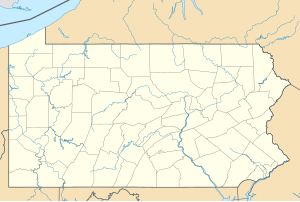Nescopeck Creek
| Nescopeck Creek | |
|
Partially frozen Nescopeck Creek
|
|
| Name origin: From a Lenape word meaning "deep black waters" | |
| Country | United States |
|---|---|
| State | Pennsylvania |
| County | Luzerne |
| Source | Olympus Pond |
| - location | Dennison Township |
| - elevation | 1,154 ft (352 m) |
| - coordinates | 41°05′15″N 75°50′29″W / 41.08750°N 75.84139°W |
| Mouth | Susquehanna River |
| - location | Nescopeck |
| - elevation | 479 ft (146 m) |
| - coordinates | 41°03′04″N 76°13′54″W / 41.05111°N 76.23167°WCoordinates: 41°03′04″N 76°13′54″W / 41.05111°N 76.23167°W |
| Length | 37.5 mi (60 km) |
| Basin | 143 sq mi (370.4 km2) |
Nescopeck Creek is a 37.5-mile-long (60.4 km)tributary of the Susquehanna River in Luzerne County, Pennsylvania, in the United States. The creek is in the Coal Region of Pennsylvania. The meaning of the creek's name is "deep black waters". The waters of Nescopeck Creek have difficulty ratings between Class I and Class III. However, during parts of the year, Nescopeck Creek is impossible to navigate due to rapids, flooding, and tight bends. Nescopeck Creek is home to a number of species of trout, although the waters are not always optimal for them. Nescopeck Creek's water is acidic, with a pH as low as 3.6 in some studies.
Much of the land in the Nescopeck Creek's watershed is forest. Farmland is common in the lower portions of the Nescopeck Creek watershed and the Little Nescopeck Creek watershed, while coal mines are more common on Nescopeck Creek's tributaries Black Creek, Stony Creek, and Cranberry Creek. A 6-mile (10 km) portion of Nescopeck Creek is considered a cold-water fishery of high quality. There are also seven natural areas in the creek's watershed, some of which contain rare species of plants and animals. On the Hilsenhoff Biotic Index, the streams in the watershed range from 0 to 18. There are 51 genera of macroinvertebrates in the creek's watershed. The habitats in the watershed primarily include mixed forest.
Nescopeck Creek's watershed is 143 square miles (370 km2) in area and lies in parts of three counties. Slightly over half of the land in the watershed is deciduous forest. The rest is perennial herbaceous vegetation, mixed vegetation and annual herbaceous vegetation, and barren land. Some sub-watersheds contain as much as 80 percent forest. Almost all of the streams in the watershed are within 330 feet (100 m) of a road. Most of the land in the watershed has a slope of 0 to 3 percent, although there are areas with a slope of 8 percent or more.
...
Wikipedia


